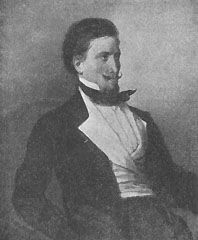Chojecki was born in the village of Wiski (in Podlasie) on the 15th of October, 1822. He spent his youth in Warsaw, conquering literary salons and making numerous friendships and acquaintances (including that with a leading Polish poet Cyprian Kamil Norwid). In that period Chojecki was also the editor of “Echo”, secretary of f the Board of Directors of the Warsaw Theatres; besides, he published in “Przegląd Warszawski” and “Biblioteka Warszawska”. In 1843 he inaugurated his worldwide travels with a journey to the Crimean Peninsula. In 1845 he settled down in Paris, where he was quickly able to enter into contact with the Socialist circles. He testified to his keen interest in all things Slavic with his extensive work Czechja i Czechowie przy końcu pierwszej polowy XIX wieku (1847). In 1848 he took part in the Slavic Congress in Prague, but was turned out from its proceedings on account of his extremely radical views. Shortly afterwards he published his treatise Rewolucjoniści i stronnictwa wsteczne w 1848 roku. During the Spring of Nations, he was also a secretary of “Trybuna Ludów”, a political daily founded and edited by Adam Mickiewicz. However, just like all the other Poles connected with that title, he had to resign his post following an intervention from the Russian embassy. Soon he was expelled from France altogether. He then left for Egypt, where he initiated oriental studies; then he visited Italy and Switzerland, from where he eventually – through the mediation of Prince Louis Napoleon – was allowed to return to France in 1852. Having renounced the extremist doctrines, he could finally assume a prestigious post of the director of the Senate Library. He also resumed his journalist career, co-founding the Paris daily “Le Temps” in 1861. He then made research trips to Iceland and Greenland. In subsequent years he focused upon his literary production in French, published under the pen-name of ‘Charles Edmond’, and on his publications from the field of Egyptology. Chojecki’s much less conspicuous output in the Polish language comprises, among others, his Wspomnienia z podróży po Krymie (1845), a novel called Alkhadar (1854), and, first and foremost, the translation of Jan Potocki’s novel The Manuscript Found in Saragossa (Rękopis znaleziony w Saragossie). He died on the 1st of December, 1899, in Bellevue, which is now a district of Paris.

